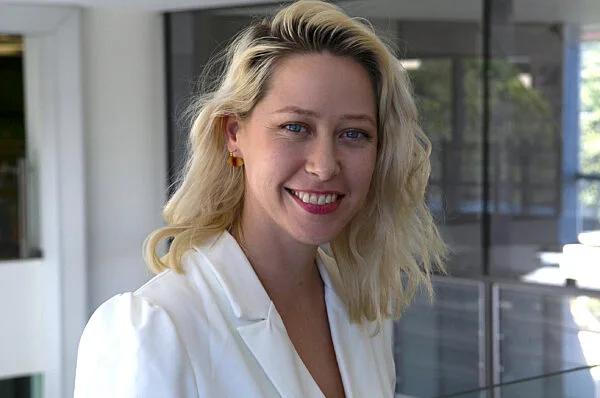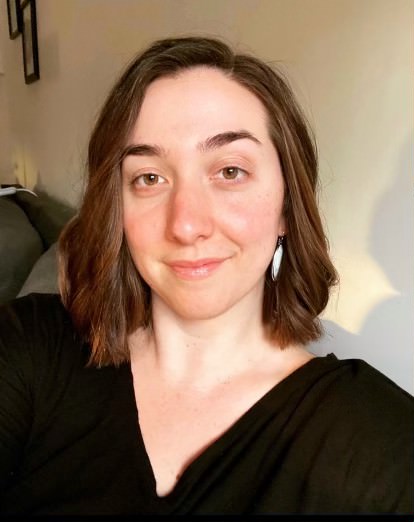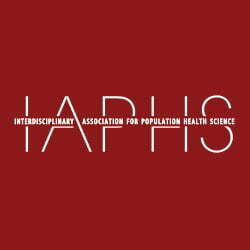Announcing Our 2024 Award Winners
IAPHS StaffCheers to our IAPHS award winners for 2024!
Awardees will be honored at our conference in St. Louis this September.
Humana Foundation Excellence in Health Equity
Bridget Goosby
Bridget Goosby is a Professor of Sociology, co-Director of the LifeHD Health Disparities Research Lab with Sociologist Jacob Cheadle, and Predoctoral Training Director in the Population Research Center at the University of Texas at Austin.
Her work explores how discrimination and social marginalization interact with the body to shape trajectories of health among targeted populations. Her collaborations have produced innovative methodological approaches and theoretical foundations that seek to improve understanding of how social conditions get into the mind and under the skin. The goal of this work is to provide rigorous interdisciplinary theory application and study designs to improve research strategies that address social inequality and population health inequities. She is a fellow of the American Association for the Advancement of Science, and her work has appeared in various venues including Proceedings of the National Academy of Sciences, Annual Review of Sociology, Social Science and Medicine, Stress: International Journal on the Biology of Stress, and International Journal of Psychophysiology.
Stephanie Robert Mentoring Award
Cynthia Colen
Cynthia Colen is a social demographer whose research intersects the fields of public health and sociology. She is currently Professor and Chair in the Department of Sociology and a research affiliate of the Institute for Population Research at Ohio State University. Dr. Colen received her Ph.D. in Health Behavior & Education from the University of Michigan and was a Robert Wood Johnson Health and Society Scholar at Columbia University. Broadly defined, her work examines the causes and consequences of racial disparities in health within the United States, with a particular emphasis on middle-class African Americans. She is interested in examining the intricate ways that socioeconomic status and race interact to produce health disparities. Her research is largely quantitative and highlights life-course processes within a single generation as well as across multiple generations. Dr. Colen has published in multiple outlets including the American Journal of Epidemiology, American Journal of Public Health, Annual Review of Sociology, DuBois Review, Journal of Health and Social Behavior, Milbank Quarterly, Social Science and Medicine, and Social Science and Medicine Population Health.
PostDoctoral Award
Brooke Brady
 Dr. Brooke Brady is an Early Career Research Fellow at the School of Psychology, University of New South Wales, and a Conjoint Research Fellow at Neuroscience Research Australia. Brooke has research expertise spanning life-course cognitive ageing, sex and gender differences in health and wellbeing, and the design and implementation of innovative app and wearable technologies for remote research. She applies her expertise to ensuring that research is accessible, and diverse voices are represented in authentic and empowered ways. Less than 3 years post-PhD, Brooke has published more than 25 papers in Q1 journals and secured over $4.5 million dollars in competitive grant funding as a chief or lead investigator.
Dr. Brooke Brady is an Early Career Research Fellow at the School of Psychology, University of New South Wales, and a Conjoint Research Fellow at Neuroscience Research Australia. Brooke has research expertise spanning life-course cognitive ageing, sex and gender differences in health and wellbeing, and the design and implementation of innovative app and wearable technologies for remote research. She applies her expertise to ensuring that research is accessible, and diverse voices are represented in authentic and empowered ways. Less than 3 years post-PhD, Brooke has published more than 25 papers in Q1 journals and secured over $4.5 million dollars in competitive grant funding as a chief or lead investigator.
Student Award
Katie R. Billings
Katie R. Billings is a PhD Candidate in the Sociology Department at the University of Massachusetts Amherst. She is a mixed methods sociologist who studies the creation and perpetuation of inequalities in health and the law. Billings’s dissertation, “Surviving Suicide,” examines how social identities shape cultural narratives about firsthand suicide survival. Using 102 in-depth interviews with suicide attempt survivors, Billings explores how survivors’ accounts can inform suicide prevention and post-vention strategies. Her scholarship is published in Social Science & Medicine, Law & Society Review, Sociological Perspectives, and the Utah Law Review. Billings’s research is funded by the National Science Foundation, the American Sociological Association Culture Section, the UMass Graduate School, and the UMass Sociology Department, and she is an active member of the American Foundation for Suicide Prevention Massachusetts Chapter. Billings is enthusiastic to join the academic job market in fall 2024. katierbillings.com
Milbank Quarterly Early Career Award
Patricia Homan
Patricia (Trish) Homan is an Associate Professor of Sociology and Director of Research and Strategic Initiatives for the Public Health Program at Florida State University. She is also an associate of FSU’s Pepper Institute on Aging and Public Policy and the Center for Demography and Population Health. She is a medical sociologist, demographer, and feminist scholar. Her research focuses on developing theory and measurement for structural sexism, structural racism, and other forms of structural oppression, and examining how these forces shape health in the United States. Her work has been published in top outlets across a variety of disciplines including American Sociological Review, Demography, American Journal of Public Health, The Milbank Quarterly, Health Affairs, Social Forces, Social Science & Medicine, Journal of Health and Social Behavior, The Gerontologist, and Journal of Marriage and Family. Her research has won multiple national awards including the 2022 NIH Matilda White Riley Early-Stage Investigator Award, the 2022 Early Career Gender Scholar Award from SWS South, the 2021 Sociology of Sex & Gender Distinguished Article Award, and the 2019 Roberta G. Simmons Outstanding Dissertation Award in Medical Sociology. Dr. Homan earned her Ph.D. in Sociology from Duke University before joining the FSU faculty in 2018.
J. Michael McGinnis Leadership Excellence Award
Bettina M. Beech

Bettina M. Beech, DrPH, MPH, FAHA is the Chief Population Health Officer and Founder of UH Population Health, and a Clinical Professor at the University of Houston. She is a population and public health scientist whose work spans clinical, community-partnered, and health policy research by examining risk factors for cardiometabolic diseases with a focus on reducing health disparities and improving minority health. Dr. Beech’s research focuses on designing and evaluating multi-level interventions to improve health outcomes and quality-of-life among underrepresented and under-resourced populations.
Dr. Beech is currently the Principal Investigator (PI) or Multiple Principal Investigator (MPI) of three major NIH grants which include the HEALTH-RCMI, a center grant in the Research Centers in Minority Institutions consortium focusing on addictions and cancer prevention; AIM-AHEAD – a national consortium grant tasked to diversify the field of data science and the use of diverse data sets in Artificial Intelligence and Machine Learning (AI/ML) studies designed to promote health equity; and the Obesity Health Disparities Program for Inclusion and Diversity among Individuals Engaged in Health Related Research (OHD PRIDE) – a research training and mentoring program for individuals from backgrounds underrepresented in the biomedical and behavioral sciences. Her current research also leverages multi-sector partnerships to conduct late-stage translational research examining the impact of loneliness and social isolation on obesity-induced hypertension and cardiovascular disease reversal interventions using defined plant-based diets among African Americans. Dr. Beech has published over 150 peer-reviewed journal articles, book chapters, and reports focusing on the full range of determinants impacting the cardiovascular health and well-being of African Americans. She is currently an associate editor of Ethnicity and Disease, is an editorial board member of Population Health Management, and lead editor of the first (2004) and second edition of Race and Research: Perspectives on Minority Participation in Health Studies (2024) published by the American Public Health Association.
Dr. Beech has been an active member of IAPHS since the early years of the organization when she was the Founding Dean of the John D. Bower School of Population Health at the University of Mississippi Medical Center (2016-2020). Her involvement in IAPHS deepened since joining the University of Houston (UH) as she established the first undergraduate chapter for IAPHS, served on the Awards Committee, and facilitated the establishment of the Humana Foundation Excellence in Health Equity Award. Dr. Beech has introduced faculty and students to IAPHS through institutional memberships as well as university fellowships sponsoring undergraduate and graduate student travel to annual IAPHS meetings. She earned a DrPH in Community Health Science from the University of Texas Health Science Center School of Public Health, received postdoctoral training in behavioral science at M.D. Anderson Cancer Center, training in population health from the Thomas Jefferson College of Population Health and completed leadership training from the American Council on Education (ACE) and from the Hedwig van Ameringen Executive Leadership in Academic Medicine (ELAM). Dr. Beech was also recently elected as a Fellow of the American Heart Association.
Ida B. Wells Public Engagement Award
Reginald Tucker-Seely
 Reginald Tucker-Seeley, MA, ScM, ScD, is an Adjunct Assistant Professor of Gerontology the Leonard Davis School of Gerontology at the University of Southern California (USC). Tucker-Seeley completed master and doctoral degrees in public health (social and behavioral sciences) at the Harvard T.H. Chan School of Public Health (HSPH) and a postdoctoral fellowship in cancer prevention and control at HSPH and the Dana-Farber Cancer Institute (DFCI).
Reginald Tucker-Seeley, MA, ScM, ScD, is an Adjunct Assistant Professor of Gerontology the Leonard Davis School of Gerontology at the University of Southern California (USC). Tucker-Seeley completed master and doctoral degrees in public health (social and behavioral sciences) at the Harvard T.H. Chan School of Public Health (HSPH) and a postdoctoral fellowship in cancer prevention and control at HSPH and the Dana-Farber Cancer Institute (DFCI).
His research has focused primarily on social determinants of health across the life course, such as the association between the neighborhood environment and health behavior; and on individual-level socioeconomic determinants of multimorbidity, mortality, self-rated physical, mental, and oral health, and adult height.
Robin Wright-Jones
A native of St. Louis and an ardent volunteer and political activist for more than 40 years, State Senator Robin Wright-Jones began her career in politics with an internal desire to improve the quality of life during political turmoil in the 1960s.
In 1967, Sen. Wright-Jones graduated from Beaumont High School and went on to attend the University of Missouri at St. Louis, focusing her studies in English. She spent 10 years as a substitute and classroom teacher for the St. Louis Public Schools and the St. Louis Archdiocese, respectively.
Sen. Wright-Jones was elected to the House of Representatives to fill an unexpired term in March 2002. While in the House, she served as Chair of the House Democratic Caucus from 2003 to 2007, and she served as Chair of the St. Louis Regional Caucus in 2004. Sen. Wright-Jones served as Chair of the Missouri Legislative Black Caucus from 2007 to 2008, and the St. Louis City Caucus from 2007 to 2008.
In 2008, Sen. Wright-Jones was elected to serve the more than 165,000 constituents located in the 5th Senatorial District in the Missouri Senate.
Darrell Hudson
 Darrell Hudson, PhD, MPH is Professor and Chair of the Department of Health Behavior and Health Equity at the University of Michigan School of Public Health. Prior to his appointment at Michigan, he was Professor of Public Health at the Brown School at Washington University in St. Louis and Director for the Center for the Study of Race, Ethnicity, and Equity at Washington University. Dr. Hudson’s career is dedicated to the elimination of racial/ethnic inequities in health. His research agenda centers on how social determinants of health, particularly racism, affect multiple health outcomes. Dr. Hudson is also striving to develop researchers and professionals who are both well trained and passionate about achieving health equity.
Darrell Hudson, PhD, MPH is Professor and Chair of the Department of Health Behavior and Health Equity at the University of Michigan School of Public Health. Prior to his appointment at Michigan, he was Professor of Public Health at the Brown School at Washington University in St. Louis and Director for the Center for the Study of Race, Ethnicity, and Equity at Washington University. Dr. Hudson’s career is dedicated to the elimination of racial/ethnic inequities in health. His research agenda centers on how social determinants of health, particularly racism, affect multiple health outcomes. Dr. Hudson is also striving to develop researchers and professionals who are both well trained and passionate about achieving health equity.
Dr. Hudson’s published research includes studies that have examined racial/ethnic differences in depression, including the effects of socioeconomic position, racial discrimination, and coping behaviors on depression. His current work focuses on the investigation of how the process of upward social mobility affects the health and well-being of Black Americans. He is also investigating the integration of mental and physical health using a life course, stress framework. Dr. Hudson has been awarded grants from the National Institutes of Health, the Robert Wood Johnson Foundation, the Ford Foundation, the Kellogg Foundation, the Russell Sage Foundation, the Foundation for Barnes Jewish Hospital, and the Missouri Foundation for Health. Currently, his research is supported by the National Institute on Aging, the Russell Sage Foundation, and the Robert Wood Johnson Foundation.
Dr. Hudson completed his doctoral studies at the University of Michigan School of Public Health, where he also received his MPH. He earned a BA in Psychology from Morehouse College. Prior to his faculty appointment, Dr. Hudson completed a postdoctoral fellowship with the Kellogg Health Scholars Program at the University of California at the San Francisco and Berkeley campuses, where he conducted research and gained additional training in social epidemiology.











All comments will be reviewed and posted if substantive and of general interest to IAPHS readers.